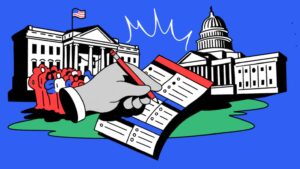
U.S. politics and elections represent a dynamic and ever-evolving landscape that shapes not only the nation itself but also has global implications. At Radiofact, we are dedicated to providing you with comprehensive coverage and insightful analysis of this critical domain.
Political Landscape:
The United States’ political landscape is marked by a two-party system dominated by the Democratic and Republican parties, each with its own distinct ideologies and policy platforms. It is a nation where politics permeates every facet of life, from healthcare and education to foreign policy and economic strategies. Our mission is to help you navigate this intricate web of political decisions and their impact on society.
In recent years, we have witnessed significant shifts in the political climate, with debates surrounding issues such as healthcare reform, immigration, climate change, and racial equity taking center stage. The political analysis we provide delves deep into these issues, offering insights into the driving forces behind policy changes and their implications for the American people.
Election Coverage:
Elections are the cornerstone of American democracy, allowing citizens to exercise their right to choose leaders who will represent their interests at various levels of government. Radiofact is committed to keeping you well-informed about elections, from local and state contests to the highest office in the land.
Our election coverage includes in-depth examinations of campaign dynamics, candidate profiles, and comprehensive reporting on election outcomes. We believe in the power of voter education and strive to provide you with a clear understanding of the electoral process. We emphasize the importance of civic participation and the protection of voting rights, ensuring that you are equipped to make informed decisions at the ballot box.
Historical Significance:
Throughout American history, elections have played a pivotal role in shaping the nation. Landmark elections have defined eras, from the contentious election of 1800 between Thomas Jefferson and John Adams to the civil rights movement’s impact on the Voting Rights Act of 1965. We believe that understanding the historical context of elections enriches our perspective on contemporary politics, and we aim to explore these historical narratives.
Technology and Elections:
In the modern era, technology has become an integral part of the electoral process. Radiofact investigates the role of technology in elections, from voter registration systems to electronic voting machines. We explore the benefits and challenges of these innovations, ensuring that you are well-informed about the latest developments in election technology.
Global Impact:
U.S. politics and elections have far-reaching global implications. The decisions made in Washington, D.C., influence international relations, trade agreements, climate policies, and more. Our coverage extends beyond national borders to encompass the global impact of U.S. political decisions and electoral outcomes, shedding light on how they resonate worldwide.
In conclusion, Radiofact is your trusted source for in-depth coverage of U.S. politics and elections. Our commitment is to provide you with accurate, unbiased, and insightful information that empowers you to understand, engage with, and participate in the political process. Whether you are following the latest developments in Washington or exploring the historical significance of elections, we invite you to join us on this journey of discovery and enlightenment in the ever-evolving landscape of U.S. politics and elections.

Elections play a pivotal role in the development and governance of a country. They contribute to a nation’s stability, progress, and democratic values in several significant ways:
- Democratic Representation: Elections are the cornerstone of democracy, allowing citizens to participate in the selection of their leaders and representatives. Through the act of voting, people have a say in the direction their country takes. This representation ensures that governments are accountable to the will of the people, promoting transparency and responsiveness.
- Peaceful Transfer of Power: Elections provide a peaceful and orderly means of transferring power from one administration to another. This prevents the need for violence or civil strife to determine leadership changes, contributing to overall political stability.
- Legitimacy: Elections confer legitimacy upon elected officials and governments. Leaders who are elected through free and fair elections gain the trust and recognition of the international community and their own citizens. This legitimacy is crucial for effective governance.
- Political Accountability: Through elections, citizens can hold their leaders accountable for their actions and decisions. Elected officials are aware that they can be voted out of office if they fail to deliver on their promises or engage in corrupt practices, which encourages responsible governance.
- Representation of Diverse Interests: Elections ensure that a diverse range of voices and interests are represented in government. Candidates from different backgrounds and with various policy positions can compete for office, ensuring a more comprehensive representation of the population’s needs and perspectives.

- Policy Decisions: Elections provide a mandate to those in power to make important policy decisions. Elected officials are expected to implement the policies they campaigned on, and this allows for the implementation of a vision for the country that aligns with the electorate’s preferences.
- Accountability of Power: Regular elections act as a check on the concentration of power. They prevent leaders from becoming autocratic or unresponsive to the needs of the people, as they are aware that they will face re-election at specified intervals.
- Encouraging Civic Engagement: Elections encourage civic engagement and political participation. They stimulate public discourse, debates, and discussions about important issues, which contribute to an informed and engaged citizenry.
- Promoting Human Rights: In democratic countries, elections often coincide with the protection of human rights and civil liberties. Free and fair elections are a fundamental human right, and governments that respect this right are more likely to uphold other human rights as well.
- Economic Development: Stable and legitimate governments resulting from elections are more likely to attract foreign investment and foster economic growth. Investors are typically more comfortable putting their resources into countries with stable political systems.
- International Relations: The results of elections can have an impact on a country’s foreign relations and alliances. Governments with a clear mandate often have more influence and credibility in international diplomacy.
- Social Cohesion: Elections can promote social cohesion by giving citizens a sense of ownership and belonging to their country. When people have a voice in the direction of their nation, they are more likely to feel invested in its success.
In summary, elections are a fundamental aspect of a functioning democracy and are essential for a country’s political, social, and economic development. They contribute to good governance, accountability, and the protection of human rights, ultimately fostering a more stable and prosperous society.